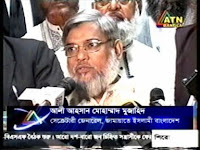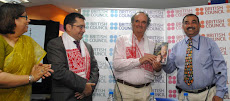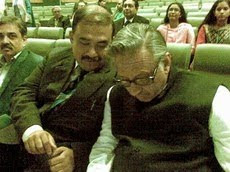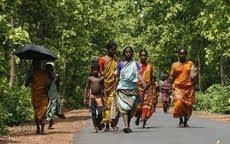Beginning Of Change In South Asia
Last month , I had predicted in no uncertain terms that Bangladesh's secular democratic party Awami League was likely to sweep the parliament elections, there were many pundits in the Indian and Western press who doubted my forecast. I had said if elections were reasonably fair, the Awami League and its allies will sweep this election. Indian intelligence agencies like the  RAW were forecasting a close fight. I have been proved right. This is not the first time my assessment on Bangladesh has clashed with a lot of so called experts in Delhi and Wasshington. In 2001, I had a huge fight with senior RAW officials who thought the parliament elections would lead to the end of the Awami League as an effective political party in the wake of 9/11 and a world wide surge of Islamic radicalism. They had started to see everything in Bangladesh through the matrix of religion. I had insisted that secular Bengali nationalsm that led to the birth of Bangladesh is still alive as a force and the Awami league , despite its defeat in the 2001 election, was still the party with the largest share of popular vote with 40.8 percent of the electorate voting for them.
RAW were forecasting a close fight. I have been proved right. This is not the first time my assessment on Bangladesh has clashed with a lot of so called experts in Delhi and Wasshington. In 2001, I had a huge fight with senior RAW officials who thought the parliament elections would lead to the end of the Awami League as an effective political party in the wake of 9/11 and a world wide surge of Islamic radicalism. They had started to see everything in Bangladesh through the matrix of religion. I had insisted that secular Bengali nationalsm that led to the birth of Bangladesh is still alive as a force and the Awami league , despite its defeat in the 2001 election, was still the party with the largest share of popular vote with 40.8 percent of the electorate voting for them. The RAW started cultivating BNP-Jamiat alliance - and look what a huge mistake India made. Under Begum Zia's government, the Islamic radicalism reached new heights of violence both inside Bangladesh and in the immediate neighbourhood of India . The former US ambassdor to Bangladesh Mary Ann Peters is another person I had a huge argument with. She saw the Jamiat e Islami as a moderate Islamic group and thought it would be nice to cultivate them to counteract the Islamic radicals. And of course cultivate the Bangladesh army and try the "minus two formula" they had earlier tried in Pakistan - get rid of Nawaz Sharif and Benazir Bhutto and cultivate Musharaff and the so called moderate Muslims . I told her this will be disastrous for Bangladesh because minus Hasina and Awami League , the secular force that so strong in Bangladesh will be decimated . But the common people of Bangladesh have now proved my point - somwething that the Sinhas and the Mary Peters never understood. They have voted for secularism and against fundamentalism in an overwhelming and decisive way. Make no mistake ,
The RAW started cultivating BNP-Jamiat alliance - and look what a huge mistake India made. Under Begum Zia's government, the Islamic radicalism reached new heights of violence both inside Bangladesh and in the immediate neighbourhood of India . The former US ambassdor to Bangladesh Mary Ann Peters is another person I had a huge argument with. She saw the Jamiat e Islami as a moderate Islamic group and thought it would be nice to cultivate them to counteract the Islamic radicals. And of course cultivate the Bangladesh army and try the "minus two formula" they had earlier tried in Pakistan - get rid of Nawaz Sharif and Benazir Bhutto and cultivate Musharaff and the so called moderate Muslims . I told her this will be disastrous for Bangladesh because minus Hasina and Awami League , the secular force that so strong in Bangladesh will be decimated . But the common people of Bangladesh have now proved my point - somwething that the Sinhas and the Mary Peters never understood. They have voted for secularism and against fundamentalism in an overwhelming and decisive way. Make no mistake ,  Bangladesh is first and foremost a Bengali nation despite attempts by military rulers like General Zia and Ershad to take it on a fundamentalist course. But all those Islamic amendments made by Zia and Ershad were never put to vote on parliament. Please ask anybody in Bangladesh who are you ? 99 out of 100 will reply - "Ami Bangali" - not not ami Mussalman. Most of them are intensely nationalist and proud of the language and culture. Those of my friends in Assam or my BJP friends elsewhere in India who would differ , I would invite them to join me on a trip to Bangladesh in mid February and witness first hand the
Bangladesh is first and foremost a Bengali nation despite attempts by military rulers like General Zia and Ershad to take it on a fundamentalist course. But all those Islamic amendments made by Zia and Ershad were never put to vote on parliament. Please ask anybody in Bangladesh who are you ? 99 out of 100 will reply - "Ami Bangali" - not not ami Mussalman. Most of them are intensely nationalist and proud of the language and culture. Those of my friends in Assam or my BJP friends elsewhere in India who would differ , I would invite them to join me on a trip to Bangladesh in mid February and witness first hand the  21st February celebrations . That is the Bangla Bhasa Shahid Dibas day that started the process of breaking up Pakistan. When thousands of Bangladeshi girls will don red and white sarees and march to Shahid Minar with mangal-pradeep in hand , my friends will realise Bengali language and identity comes first for these people. Unlike the Bangladeshis who have entered Assam, given up their linguistic and cultural identity for land but have remained committed to their religious identity to allow people like Maulana Baddruddin Ajmal to rise from their ranks. These are poor peasents for whom land mattered above all else - they lacked the powerful middle class that grew in east Pakistan through the Bangla bhasa movement . In fact , the middle class from east pakistan never came to Assam - they remained in their place and fought Pakistan.
21st February celebrations . That is the Bangla Bhasa Shahid Dibas day that started the process of breaking up Pakistan. When thousands of Bangladeshi girls will don red and white sarees and march to Shahid Minar with mangal-pradeep in hand , my friends will realise Bengali language and identity comes first for these people. Unlike the Bangladeshis who have entered Assam, given up their linguistic and cultural identity for land but have remained committed to their religious identity to allow people like Maulana Baddruddin Ajmal to rise from their ranks. These are poor peasents for whom land mattered above all else - they lacked the powerful middle class that grew in east Pakistan through the Bangla bhasa movement . In fact , the middle class from east pakistan never came to Assam - they remained in their place and fought Pakistan.The latest parliament elections in Bangladesh is a vindication of all I have said so far about that country . That by and large people in Bangladesh are secular , they have a strong intelligensia much more committed to secularism and democracy, that they have long been oppressed by military rulers whose nexus to fundamentalists is much like Pakistan.The behaviour of the Bangladesh army and military intelligence and they way they pandered to Islamic extremists bear close resemblance to Pakistan. But that's got nothing to do with Bangladesh people . And whenever they have been able to vote freely - in 1970 Pakistan elections , in the elections between 1971 and 1975 , to a certain extent in 1996 - the people of Bangladesh have voted for secular politics overwhelmingly.
 The latest parliament polls in Bangladesh marks the beginning of change in South Asia's battle against terrorism. Prime Minister Sheikh Hasina has given charge of the Home MInistry to a very capable woman lawyer Sahara Khatun who is known to be very tough with officials. I chatted with Sahara Khatun, whom I have known for a while, and she said she would create a specialist anti-terror agency with select officials who were not only known to be efficient but also committed to secular politics. "We already know quite a bit about the Islamic radicals, we will go after them in a merciless way, either they surrender or they will be hunted down," Sahara Khatun said in a firm voice. Then came the catchpoint - "We will not do it for India , we will do it for ourselves becauise we have suffered so long at the hands of Islamic extremism backed by certain political forces at home and abroad." Sahara referred to the July 2004 attacks on the Awami league rally that nearly killed Hasina .
The latest parliament polls in Bangladesh marks the beginning of change in South Asia's battle against terrorism. Prime Minister Sheikh Hasina has given charge of the Home MInistry to a very capable woman lawyer Sahara Khatun who is known to be very tough with officials. I chatted with Sahara Khatun, whom I have known for a while, and she said she would create a specialist anti-terror agency with select officials who were not only known to be efficient but also committed to secular politics. "We already know quite a bit about the Islamic radicals, we will go after them in a merciless way, either they surrender or they will be hunted down," Sahara Khatun said in a firm voice. Then came the catchpoint - "We will not do it for India , we will do it for ourselves becauise we have suffered so long at the hands of Islamic extremism backed by certain political forces at home and abroad." Sahara referred to the July 2004 attacks on the Awami league rally that nearly killed Hasina . What about the rebels fromn North-east India ? In 1996, many in the Awami League had sympathy for groups like the ULFA. One leading Bangladesh leftist intellectual Farhad Mazhar actually told me :" They are fighting Indian colonialism like we fought Pakistani colonialism , so why we attack them to please India." That sentiment has changed because in the last seven years, the Awami League feels, the ULFA and such other groups have been used by the BNP and the army
 against the Awami League. So I dont think the ULFA or any other northeast Indian group will get any sympathy from the new government . Whether they will have enough clout and influence on the army and the DGFI to throw these rebels out remains to be seen. My own feeling is Hasina's govt will first go for the Islamist extremist groups like HUJI and also the Jamiat. That is why former Air Marshal A K Khandkhar has been taken into the cabinet. He has said the war crimes trial for 1971 will start soon. That will mean huge trouble for the Jamiat and all other Islamist groups becauise
against the Awami League. So I dont think the ULFA or any other northeast Indian group will get any sympathy from the new government . Whether they will have enough clout and influence on the army and the DGFI to throw these rebels out remains to be seen. My own feeling is Hasina's govt will first go for the Islamist extremist groups like HUJI and also the Jamiat. That is why former Air Marshal A K Khandkhar has been taken into the cabinet. He has said the war crimes trial for 1971 will start soon. That will mean huge trouble for the Jamiat and all other Islamist groups becauise  1971 they collaborated with the Pakistan army. Hasina has huge pressure from within her party and the powerful Bangali intelligencia to go ahead with the war crimes which is a strong political way of eliminating religious extremism at the grassroots. On top of that, if they get the new anti terror agency to bypass the army and DGFI and hit the HUJI and such other groups, the Islamic radicals will be caught in a nutcracker.
1971 they collaborated with the Pakistan army. Hasina has huge pressure from within her party and the powerful Bangali intelligencia to go ahead with the war crimes which is a strong political way of eliminating religious extremism at the grassroots. On top of that, if they get the new anti terror agency to bypass the army and DGFI and hit the HUJI and such other groups, the Islamic radicals will be caught in a nutcracker.They will meanwhile pressurise the north-eastern rebels to flee -if they don't , then they will face tough police action.
Post your Feedback on this column at : feedback@bengalnewz.com OR feedback2bn@gmail.com







